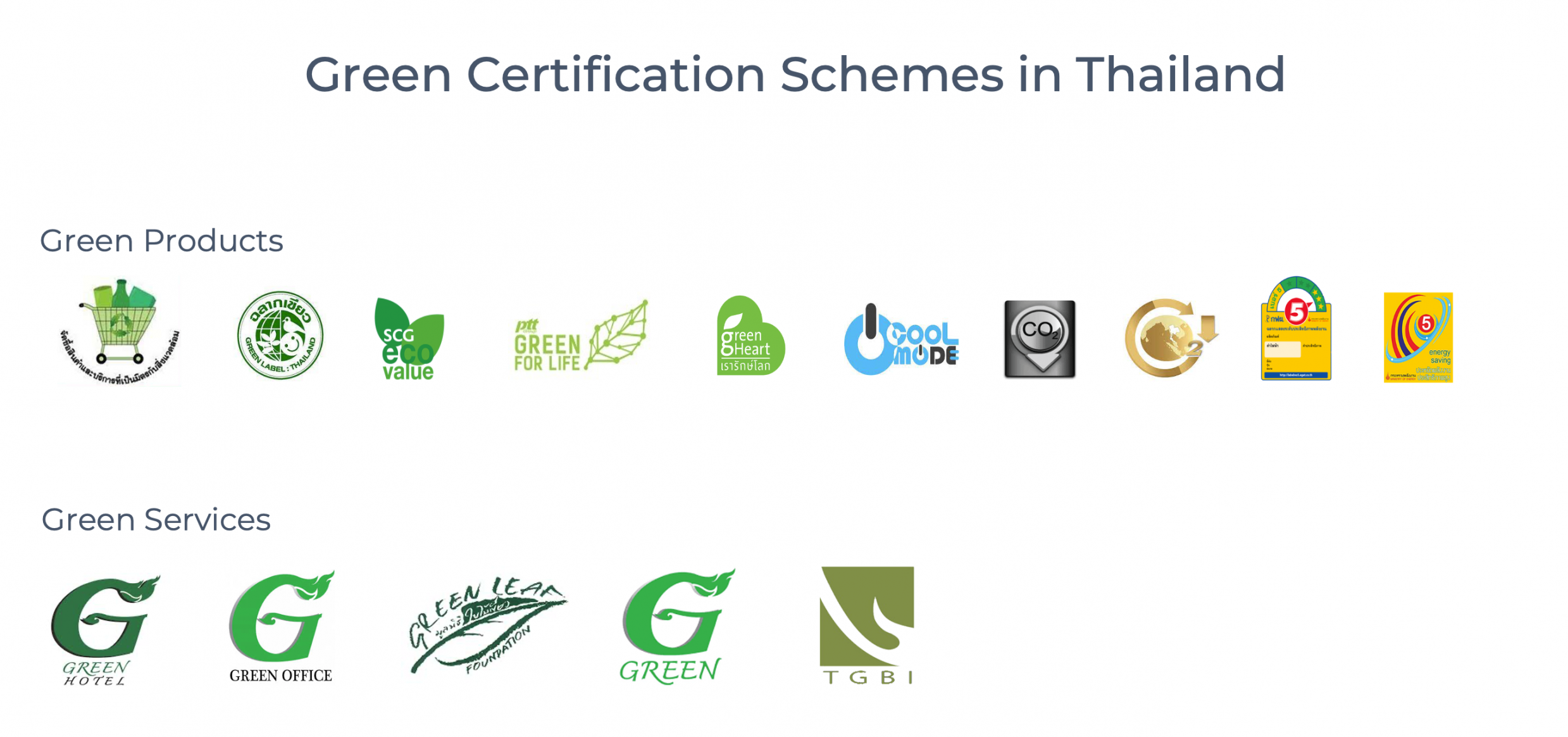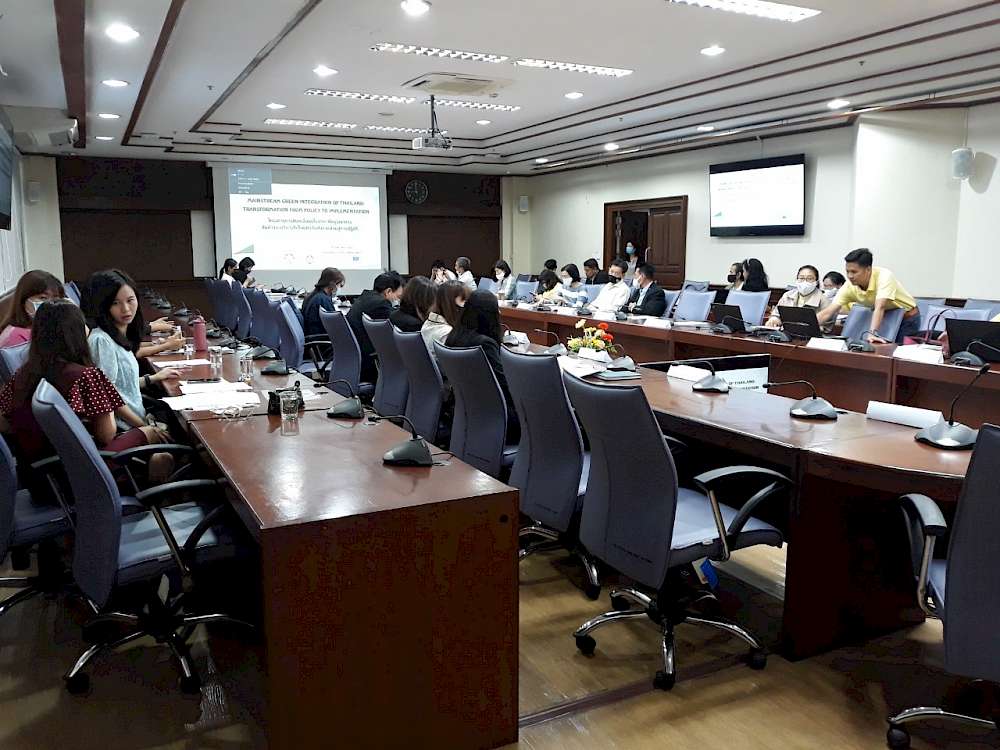
The recent National Economic and Social Development Plan (NESDP) 2017-2021, which is built on the 9th-11th NESDP and His Majesty's "Sufficiency Economy" philosophy, provides a policy framework for identifying strategic directions concerning Thailand's sustainable social and economic development within a healthy environment. Key strategies in the 12th NESDP stress the following areas:
- Creating a justice society and reducing social inequality;
- Human capacity promotion and development;
- Strengthening Thailand's economic potential sustainability and enhancing Thailand's competitive edge;
- Promoting sustainable consumption and production (SCP);
- Maintaining domestic security and promoting good governance.
Promoting SCP is one of the six key strategies in the 12th NESDP. The Office of Natural Resources and Environmental Policy and Planning (ONEP) under the Ministry of Natural Resources and Environment (MONRE) has collaborated with the EU through the SWITCH-Asia Programme to implement the SCP Roadmap 2017-2036 in Thailand. The roadmap was approved by the National Committee on Sustainable Development in 2017 with core strategies to enhance Thai society towards sustainable consumption and production and using supported factors for sustainable development.
At the national level, three departments under MONRE play a crucial role in SCP policy and implementation. The Office of National Resources and Environmental Policy and Planning (ONEP) is responsible for reporting on the implementation of SDG 12 and developing the SCP Roadmap 2017-2036. The Pollution Control Department (PCD) takes responsibilities on water, chemical and waste management, environmental management, and green procurement. The Department of Environmental Quality and Promotion (DEQP) is responsible for providing SCP knowledge and raising awareness on resource efficiency through promotional campaigns, exhibitions and rewards.
The number of green certification schemes for product and services in Thailand established by various organisations has been growing. Some of them are recognised by the government's green procurement programme such as Thai Green Label, Carbon Footprint, Energy saving label, CoolMode, Green Leaf, and Green Hotel. The private sector also has its certification schemes for environmentally-friendly products/material such as SCG Eco-Value, Green for Life, and Green Heart.

Some of those green certifications are certifying the same products and services with different principles and approaches which causes confusion for consumers and on the implementation of the green public government. While the number of green certification schemes has been increasing, the number of certified products and services is still limited and the implementation of the green public procurement of the country has yet to be improved. It implies that Thailand is in need of a strategy to promote environmentally-friendly products and services to support the implementation of green procurement.
The Thai government has requested the EU SWITCH-Asia SCP Facility to provide technical assistance on the project "Mainstream Green Integration of Thailand: Transformation from Policy to Implementation". The overall objectives of the project are to:
 Enhance the procurement of environmentally friendly products and services in Thailand;
Enhance the procurement of environmentally friendly products and services in Thailand; - Study all types of environmentally friendly products and services and cluster them for efficient management;
- Develop the environmentally products and services policy and action plan;
- Provide knowledge and information for raising awareness on the environmentally friendly products and services, and to share experiences on the environmentally friendly products and services through good practices and lesson learned among the ASEAN Member States and other leading SCP countries.
On the 4th of August 2020, the SWITCH-Asia SCP Facility, in cooperation with the Pollution Control Department (PCD), organised a focus group meeting to discuss and get feedback on the proposed criteria for clustering environmentally-friendly products and services and on the proposed guideline for the policy development and action plan on promoting environmentally friendly products and services. Approximately 60 participants attended the meeting, including government officials, representatives from the private sector, and NGOs – implementing organisations of green certification schemes in Thailand, and relevant governmental organisations on national procurement and SCP policy.
The discussion was conducted in two parallel groups, one for environmentally friendly products, and the other for services. The meeting’s outcomes will be used as inputs for formulating the first draft on the Green Integration Policy and National Green Directory, which will be proposed during the stakeholder consultation in the second week of October 2020. By the end of 2020, the revised draft policy and national green directory will ultimately be submitted to the MONRE Committee on SDGs for comments and feedback.
For more information contact:
Loraine Gatlabayan
Key Expert, Southeast Asia
SWITCH-Asia SCP Facility
Lunchakorn Prathumratana
Project Manager
SWITCH-Asia SCP Facility


